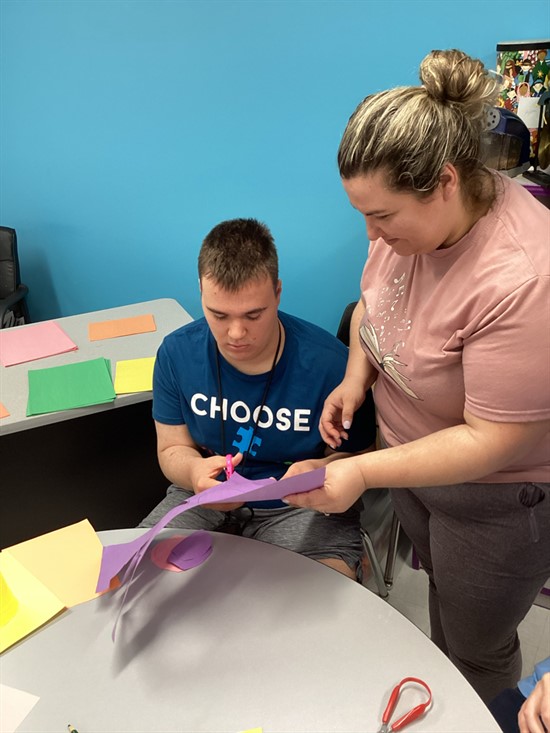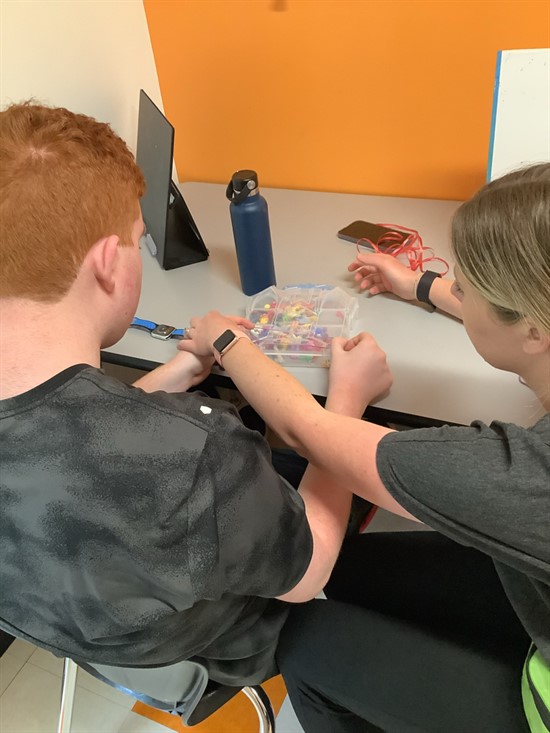HJEC August 2025 Newsletter
What's Happening?
August 2025
-Week of 8/18/25: School Vacation
-8/26/25: Sports Clinic - Summer Olympics
-8/28/25: Parent Advisory Group - Generalization of Skills to Home
-8/29/25: Ice Cream Truck
-8/30/25: Family Meet-up - Salem Willows
September 2025
-9/1/25: No School - Labor Day
-9/4/25: Jersey Day
-9/16/25: Fire Department Visit
-9/26/25: No School - Staff Development Day
-9/27/25: Family Meet-up - Brooksby Farm
Summer Speech

Summer is a time when we are all mostly outdoors. Swimming, going to the beach, relaxing in the sun, and playing in the yard are all popular activities when the sun is out, and incorporating your student’s speech and language skills in these kinds of activities doesn’t have to be a challenging task!
Identifying and Labeling:
- While at home and out in the community, practice identifying and labeling different nouns and verbs that you may see, particularly in the summertime!
- For example: Ocean, pool, swim, sand, ride, bike, slide, swing, etc.
Attributes:
- Take turns with your students describing things you see outside!
- At the beach- Is the towel wet or dry? Is the sand cold or hot?
- In the yard- describe items by their size, shape, or color

WH- questions & Recalling Events:
- Did you recently go on vacation or do a fun summer activity?
- Take pictures of the activities you do with your student. Ask them what is happening in the pictures (or point)!
- For example: Who got ice cream with Susie? What did you build at the beach? Where did you go with Mom?
Incorporating communication and speech skills into summer fun helps children keep growing and learning. It's a great way to mix play with practice, ensuring they stay on track and build confidence while having a blast. Keep the learning going, and enjoy a fantastic summer!
Promoting Independence Through Errorless Instruction

Whether you’ve watched a YouTube video to figure out how to complete a home repair or had someone show you how to complete a math problem, everyone has received some assistance to complete a task they initially didn’t know how to complete. Instruction based on the principles of Applied Behavior Analysis involves the systematic development of individualized teaching procedures. Most often, the overall goal of instruction is to promote independence that will produce meaningful changes in the learner’s life. An important component of instruction is what’s referred to as prompting. Prompting is essentially providing the learner with assistance to complete an unknown or less familiar task. As the learner works on the skill, that assistance is reduced to promote independence. At Hopeful Journeys, prompting is an integral part of students’ programming and is individualized to meet the needs of each student.
At Hopeful Journeys, we utilize what is called an errorless learning approach. An errorless approach to teaching involves providing full prompting when first introducing a skill. This allows the learner to become familiar with the skill, reduce the likelihood of making errors, and creates a history of success when completing the task. Based on the learner’s success, the amount of prompting is gradually reduced while keeping student errors to a minimum. For example, when teaching a learner to complete a daily living skill of washing their hands, the teacher may initially need to provide full physical prompting (i.e., assistance) to have the learner complete all the steps of washing their hands. Over time, the teacher can gradually reduce the prompting (e.g., provide only light physical assistance) and allow the student to do more of the task independently. With repeated opportunities, this approach is effective at promoting skill development and independence.

In addition to physical prompting, other types of prompting can be used within an errorless learning approach. For example, when teaching a learner to communicate using their augmentative alternative communication (i.e., AAC) device, the teacher may initially provide a full model or gestural prompt to show the learner where specific buttons are on the device, or assist the learner in making a functional communication request (e.g., requesting wants and needs). Over time, the teacher can reduce the amount of modeling or gesturing they are providing, based on the student’s demonstrated success. Similarly, vocal prompts can be used to model or prompt various vocal verbal communication. For example, if a learner is reaching for a cracker during snack time, a teacher may initially model the request, “cracker” and then give the learner an opportunity to make the request on their own. Over time, the teacher may only provide a partial model “cra” and give the learner an opportunity to request it on their own. In most cases, the goal is to completely reduce and remove prompts so that the learner is completing the skill on their own.
An errorless learning approach where full prompting is initially provided and then reduced based on the learner's success can be an effective way of teaching many students at Hopeful Journeys. This method is helpful with reducing frustration and promoting confidence when introducing a new skill. The type of prompt used may be specific to the type of skill being taught and based on what is most effective for the learner. During upcoming Clinical Corner articles, we’ll explore additional methods for promoting student independence.
Student Spotlight: Bella!

Bella started at Hopeful Journeys in February of 2015, and since then, she has become a vibrant member of the school community. Bella is known for her outgoing personality, sense of humor, kindness and determination. She is truly a social butterfly. She knows the name of nearly every student and staff member, and she has built friendships that span across all Teams. When asked about her favorite part of school, she didn’t hesitate to say “talking with friends,” which perfectly captures her social nature.
A fun fact about Bella is her love for history and travel. In her free time, she enjoys researching destinations around the world, especially those with historical significance. After learning about Thomas Jefferson, Bella was inspired to visit his home, Monticello, in Virginia with her family.
Bella is also a dedicated and hardworking student who takes great pride in applying her skills in real-world settings through various community-based work experiences. Over the years, she has gained valuable experience working at the local library, food pantry, Backbeat Coffee Roasters, nursing home, and Miller Mortgage. During these experiences, Bella successfully generalized academic skills such as taking inventory and using mental math, as well as social skills like professionalism and communication with managers or customers. She consistently returns from these opportunities eager to share her stories and experiences with teachers and classmates, reflecting both her enthusiasm and her growth.
In addition to her academic and community achievements, Bella has made tremendous progress in developing her executive functioning skills. She independently creates her daily schedule, sets reminders, uses timers, sends and replies to emails, makes phone calls and plans ahead with confidence. Bella also loves planning for and participating in school events and is always an enthusiastic presence in any activity.
Bella is always ready to lend a helping hand and consistently demonstrates kindness toward her classmates and friends. This year, she supported a classmate by regularly checking in and walking with her from one location to another, offering friendship and a comforting presence during transitions and group activities. In addition to her kindness, Bella enjoys sharing the coping strategies she has learned with others. Whether it’s practicing deep breathing, listening to calming music, or suggesting helpful tools like wearing headphones, she not only uses these strategies herself but also takes the time to teach and encourage others to try them.
As Bella prepares for her graduation in September, a milestone she has been thoughtfully planning for months, we are excited to see her apply everything she has learned. She has shown how much she values connection and celebration by writing heartfelt letters to recent graduates, wishing them well on their next journey. Bella is also preparing her own graduation speech! We know she will continue to grow, learn, and positively impact those around her wherever she goes.


Mission Moment: Inspiring Hope, Building Potential and Creating Opportunities
Our Mission
Hopeful Journeys’ mission is to provide quality and individualized education to children with autism spectrum disorders and other developmental disabilities. We strive to build better futures for children and families by helping them to reach their fullest potential and enabling them to live more productive and independent lives.

To me, the Hopeful Journeys' mission is to provide the highest-quality individualized services to every one of our students. This starts from the second you walk through the door with our amazing administrative staff, 1:1 direct care teachers, managers, BCBAs, and everyone in the building supporting our students. Each person is dedicated to shaping brighter futures for our students and their families by empowering them to achieve their utmost potential and lead fulfilling, independent lives.
-Kaitlyn Kozsan, BCBA (Team I)
Breakheart Reservation’s Newest Volunteer - Logan
Logan has been a shining example of hard work and enthusiasm at his job at Breakheart Reservation in Saugus. Logan has truly embraced the opportunity to contribute to his community by walking around the reservation and cleaning up trash. His excitement for this role is evident—he arrives at school early each day, eager to start his two-hour shift. During his time at Breakheart, Logan has honed important skills such as safety awareness in the community, effective communication with community members, and teamwork with his peers. He meticulously picks up and disposes of trash, ensuring he wears gloves and follows all safety protocols. Logan’s favorite part of the day comes at the end of his shift when he gets to purchase a snack for his excellent work during his shift.
Before Logan could embark on this vocational journey, he put in significant effort to prepare himself at school. He worked diligently to build up his vocational skills and work shift duration through various tasks. This included using vocational binders to organize his responsibilities and clean different environments around the school, staying on task, following directions, and working well with his peers. Logan’s willingness to help out around the school, whether by assisting his teachers or supporting his classmates, has always been one of his standout qualities. When the opportunity to work at Breakheart was presented to him, Logan was thrilled. His dedication to preparing for this role has paid off, and he now takes great pride in his contributions to the community.



Our Staff Continue to Grow and Learn!

At Hopeful Journeys, staff development is a key part of our mission to help every student achieve greater independence and reach their full potential. In May and June, our team engaged in targeted training sessions focused on building essential instructional skills, strengthening case management practices, and improving communication and data collection. These sessions ensured that staff are well-equipped to track progress, collaborate effectively, and support each student’s learning journey.

In June, we also turned our focus to preparing students for life beyond school. Transition Consultant Kathy Kelly led an engaging training on adult services and independent living skills, while staff completed vital refreshers on policies and procedures, medical emergencies, and health conditions. These hands-on, high-impact development days reinforce our commitment to delivering quality education and care, ensuring that our staff—and our students—continue to grow and succeed.
We’re looking forward to another exciting school year providing quality education and learning to our students!
